
PHILADELPHIA, 16 September –- Gamification with Kevin Werbach of the University of Pennsylvania’s Wharton Business School, Week 3!
The previous unit explains the benefits of a behavioral approach to gamification; this one identifies the risks and alternatives.
Class Notes – Part 6 – Psychology and Motivation II
6.1 Limits of Behaviorism
Speed Camera Lottery –
Generic Speed Sign – feedback on speed + fear of ticket / punishment – not learning
What’s different about Speed Cam Lottery? – peeps LOVE lotteries! Even with terrible odds.
Why do peeps love lotteries? Now we have to go beyond Behaviorism… and think about motivations.
B.F. Skinner’s work fell out of favor in psychology
(still big in many areas including Quantified Self)
but the technology scared people >> Socialism, Fascism…
Behaviorism > Black Box
but Game Thinking > person as a Player
6.2 Dangers of Behaviorism
• Manipulation – systems designed to make people do things
— a slot machine is an addiction machine > negative consequences
— ethical issues
— customer push-back on manipulation
Behaviorist approach tends to make us see everything like a casino owner.
Hedonic Treadmill – rewards, feedback loop, dopamine – have to keep giving reward
… extrinsic motivation replaces intrinsic (monkeys + grape juice + tone)
–>dopamine system doesn’t give pleasure for rewards, but for ANTICIPATION of rewards
people’s brains are always trying to figure out system / pattern, at which point it’s no longer interesting – kill rewards by making them become expected
Status – very powerful motivator
• Frequent Flyer loyalty programs
— notion is that people chase that status – yes, they do, but not all the time
behaviorist approach tends to reduce down to status
6.3 Extrinsic and Intrinsic Rewards
Cognitivism – alternative to Behaviorist approach
– opening up the black box
If we start to think in a cognitivist way, we start to distinguish between different kinds of motivation and different kinds of rewards
Intrinsic Rewards – you do it because you want to, varies for different people
Extrinsic Rewards – doing something for some reason other than the thing itself. About the reward.
Gabe Zichermann – “SAPS”
• Status – we do it because other people will think we’re cool
• Access – to something special that other people don’t have
• Power – able to do certain things
• Stuff – tangible rewards
Tangible rewards cost You real$, things like status don’t.
AND (according to GZ) Status is more motivating than Tangible
Are Foursquare Badges Intrinsic or Extrinsic motivators?
can be both…
6.4 How Rewards can De-Motivate
Rewards acting as Extrinsic motivators can cloud out the motivation that was already there.
“Over-Justification Effect”
studies in many areas show Extrinsic motivation / rewards De-motivating the Intrinsic activity itself. These studies are generally focused on “Interesting Tasks,” tasks that start off Intrinsically motivating on some level.
Reward types matter:
• Tangible Rewards are the most de-motivating, because they’re the most external.
• Unexpected Rewards are much less de-motivating: “Hey here’s a bonus for your great work!”
• Performance-contingent Rewards can go both ways. – based on achievement, doing something effectively. If the whole point is the end-point as opposed to doing something well, then de-motivating. But if it’s informational, if the reward is a marker of good work, then it’s motivating.
6.5 Self-determination theory
Ed Desi & Richard Ryan – 70’s – U of Rochester – people not always motivated by rewards.
Motivational Spectrum:
Amotivational >> Extrinsic >> Intrinsic
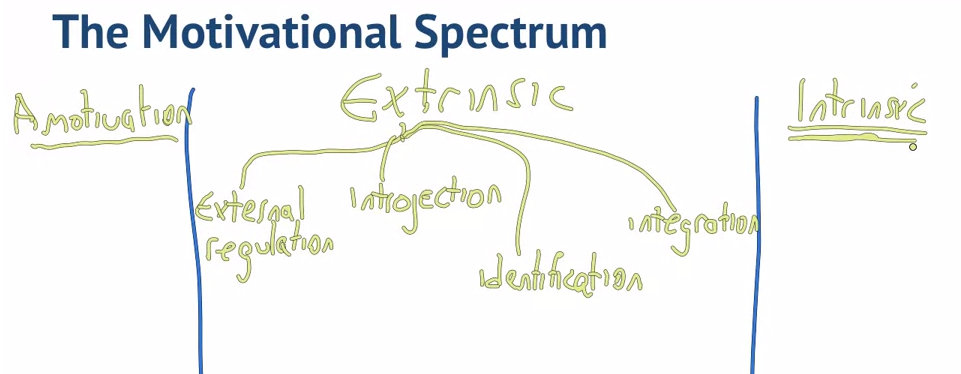
Extrinsic breaks down to:
External Regulation – less powerful motivation
Introjection – take external motivators and make them our own, eg Status – I may not really want to do this, but other people will like me.
Identification –
Integration – complete alignment between my goals and the thing – eg Exercise, I really want to, but don’t love it, so a little push still helps
What does it actually take to make something Intrinsically motivating?
• Competence – achieving something
• Autonomy – I’m in control, doing it by my own free choice. Player’s choice, not game’s
• Relatedness – activity is connected to something beyond myself, meaning and purpose
even standard PBL can be more Intrinsically motivating
eg: Fitocracy
6.6 First half wrap-up
Congratulations!
You’ve made it through the 1st 1/2 of the course!
Here’s your Badge!
1st 1/2 – Frameworks & Concepts
2nd 1/2 – Application
Optional Materials
Alfie Kohn, Studies Find Reward Often No Motivator, Boston Globe, January 19, 1987
Sebastian Deterding, Meaningful Play: Getting Gamification Right, Google Tech Talk, January 24, 2011
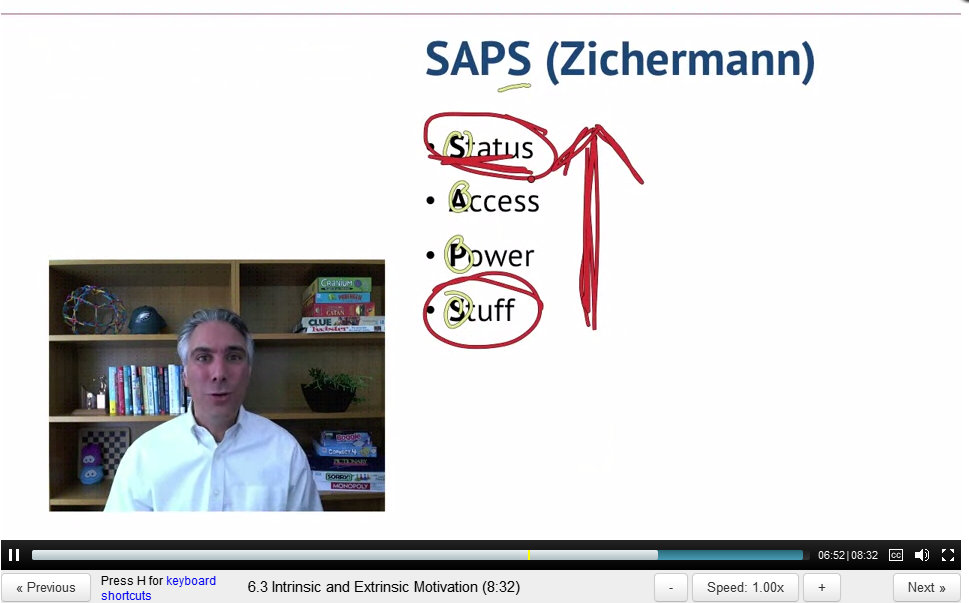
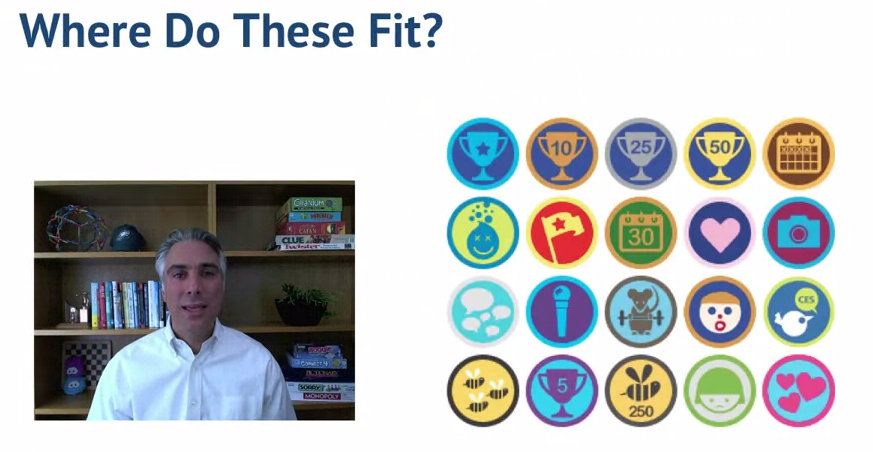

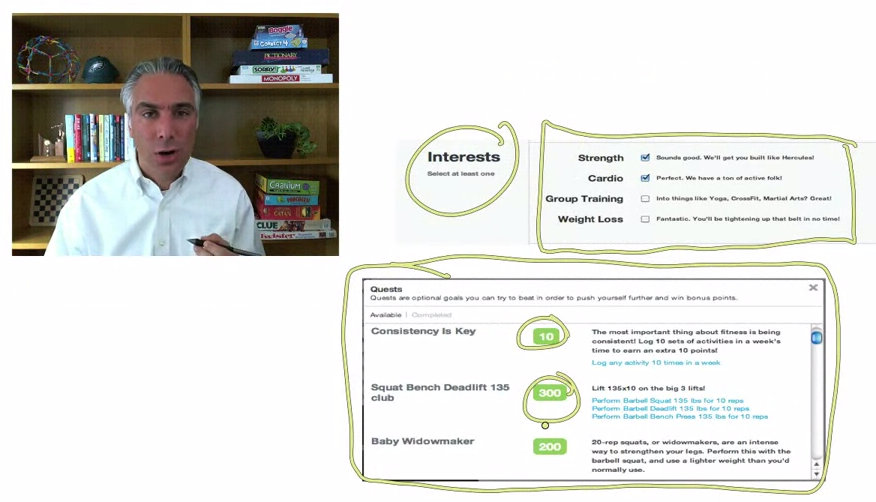
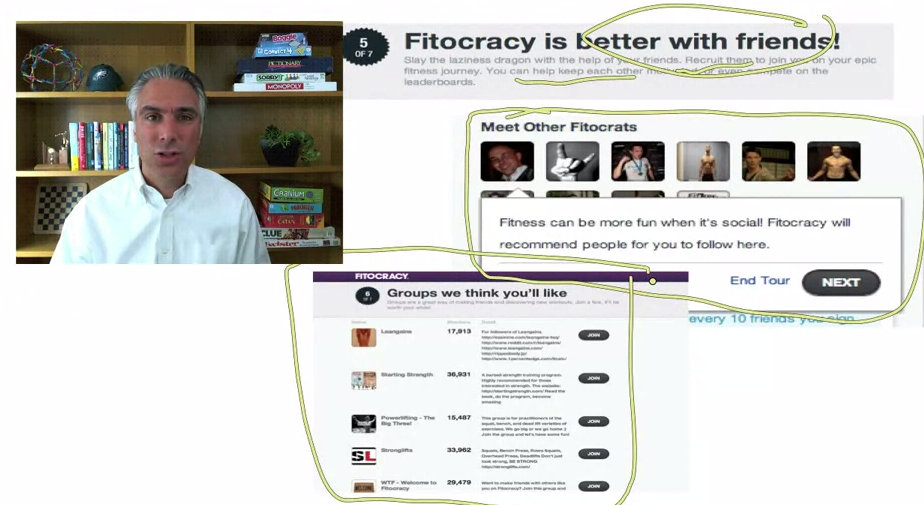
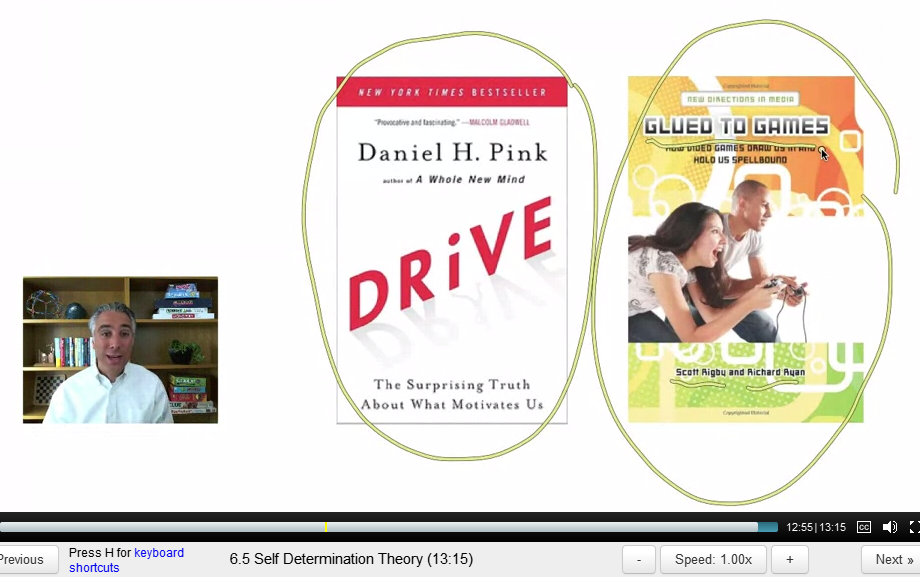
Meaningful badges/awards for me seem to be my Alexa ranking (our iRez ranking too), the number of Like’s my Fickr photos get, but most of all I love the little Like photos that we get on our WordPress pages. These are motivators for me. It’s a real “go figure”.
I have come to value the comment exchange here on WordPress. I had relatively little of this on Google Blogger, but WordPress has somehow mastered this technology. As soon as I write a post for my blog or iRez, I immediately start pushing it out on my social connections.
The posting and social connection process is game-like to me. When something I wrote starts pulling in interest from other bloggers, especially non-bloggers, I am genuinely pleased. We get various achievement awards here on WordPress that seems to encourage this too.
However, when I look at myself in a critical frame of mine I’m ashamed of myself. It’s true when I think of myself as “promoting” myself I equate that with being egotistical, and I equate egotistial with many negative feelings. I know from chatting with other bloggers, this is not a problem unique to me.
Love the vid. Great speaker.